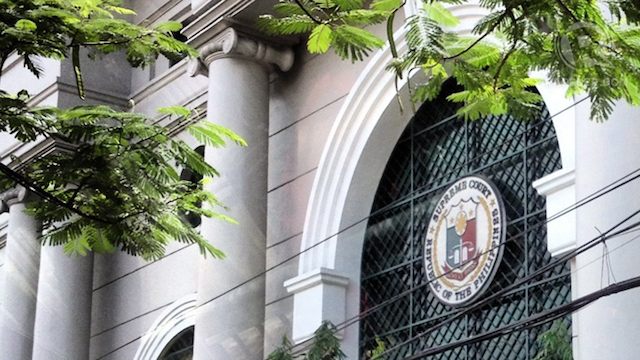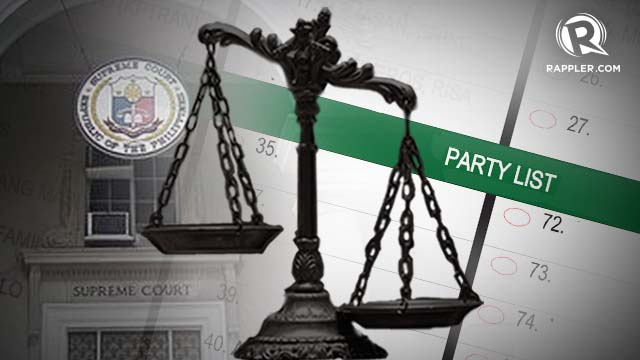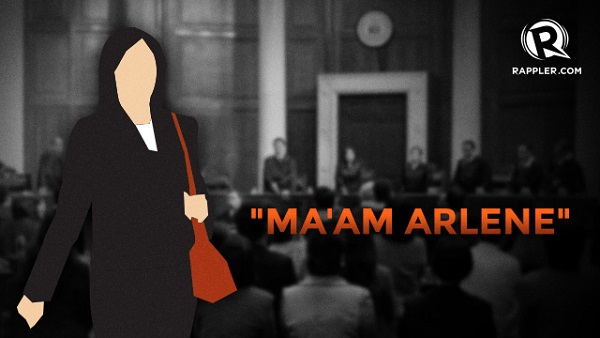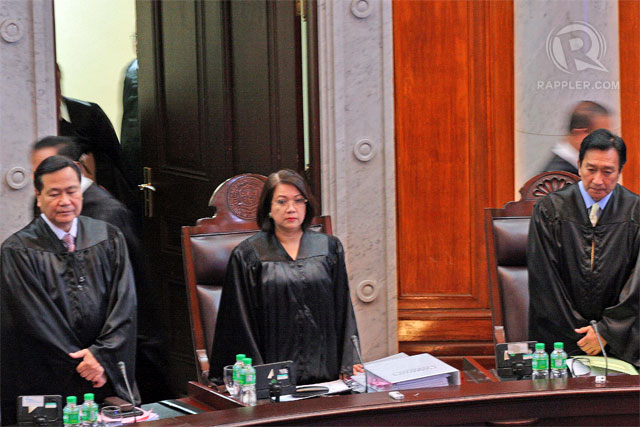SUMMARY
This is AI generated summarization, which may have errors. For context, always refer to the full article.

MANILA, Philippines – The Philippine Supreme Court has gone through a history of highs and lows.
But it was a different high – especially for the thousands of Filipinos reeling in discontent over alleged corruption in government – when the Priority Development Assistance Fund (PDAF) or the pork barrel of lawmakers was declared unconstitutional.
In 2013 – when news of fake non-governmental organizations siphoning taxpayer’s money broke out – the PDAF or the discretionary funds of the country’s legislators became subject of the people’s intense scrutiny and collective anger. (CLICK: Pork Tales: A story of corruption | Rappler Special Report)
Many regarded the lump sums as bane, saying they bred political patronage and were prone to misuse.
To see the judiciary engage in a battle of wills with the legislative branch in an issue that increasingly became urgent for the Filipino people was a positive indicator that the system of checks and balances worked.
While ideally popular opinion does not hold sway over court decisions, the decision was met with overwhelming public approval. Any celebration would be premature, however, pending the prosecution of all those involved in the pork barrel scam.
Tug of war on electoral disputes
To be clear, the judiciary’s tug of war with the legislative branch was not limited to the PDAF decision but included electoral disputes as well.
The SC ruling on the disqualification of Regina Reyes as Marinduque representative stood against the position taken by the House of Representatives Electoral Tribunal (HRET). (READ: Poll protests: Is the Supreme Court clipping HRET’s powers?)

The HRET posits that a winning congressional candidate becomes a House member upon being declared winner by the canvassing board, while the SC ruled it is only after he or she has taken his or her oath before the Speaker in an open session.
The HRET – following the High Court’s disqualification of Reyes in favor of rival Llord Allan Jay Velasco – maintained that it is the “sole judge of all contests relating to the election, returns, and qualifications of their respective members.” It refused to install Velasco in Congress.
Velasco is the son of Associate Justice Presbitero Velasco, who inhibited himself from the case but was later on accused by Reyes of “wielding his influence” over the other justices.
SC squabble?
In 2013, the SC issued an estimated 922 rulings with doctrinal value. The months of June and July had the most number of rulings issued, both reaching over a hundred.
The quantity of cases alone makes the task of the SC justices a daunting one.
Yet, even the esteemed justices are not immune to petty squabble. Earlier in her term, Chief Justice Maria Lourdes Sereno was reportedly made to feel not too welcome by the more senior justices. Four justices – Velasco, Antonio Carpio, Teresita De Castro, Roberto Abad, and Arturo Brion – had been appointed to the High Court earlier and served longer than Sereno.
Sereno was appointed Chief Justice, even as Carpio was the most senior of the justices.
Reports allege justices not showing up during flag ceremonies and skipping weekly lunches after their en banc meetings. (READ: Scrutinizing Sereno, one year after)
Rule-reversal on party-list system
Perhaps the most contested SC decision that made it to the headlines of 2013 is the Court’s rule-reversal on the party-list system.
In its analysis of the intent of the party-list law, the SC ruled that a party-list is not solely for marginalized sectors. (READ: SC shakes up party list in new verdict)
The original intention of the party list law, according to the High Court, was to create a system of proportional representation for groups and parties of different kinds and not just the marginalized. The SC ruled that this interpretation was in keeping with the Constitution.
An unprecedented number of party-list groups was disqualified by the Commission on Elections (Comelec) as result of the decision.

Organizations participating in the party-list system can now either represent the “marginalized and underrepresented” or those who lack “well-defined political constituencies.”
Sectors that lack “well-defined political constituencies” include professionals, the elderly, women, and the youth. Marginalized and underrepresented sectors, on the other hand, include: labor, peasant, fisherfolk, urban poor, indigenous cultural communities, handicapped, veterans, overseas workers, and other similar sectors.
The 2013 SC decision, which reversed a decade-old ruling, provides a chance for small ideology-based and cause-oriented parties that lack “well-defined political constituencies” to win seats in Congress. However, due to greater competition, it diminishes the winnability of sectoral groups representing the marginalized.
For many groups wanting to acquire a seat in the House of Representatives through the party-list system, a dilemma arises involving campaign strategy. Since non-marginalized sectors can now be represented, groups have the choice of framing their campaign differently. Nominees of party-list groups do not necessarily have to be from the sector they represent, as long as the nominees have a “track record of advocacy for their respective sectors.” This opens the door to more traditional representatives or even politicians who can claim to possess this track record.
Fixer in the judiciary?
While public outrage has been directed at Congress for most of the year due to the pork barrel scam, another corruption scandal looms in the judiciary.
Reports on an alleged big-time fixer in Philippine courts – casually called Ma’am Arlene – and bribery among judges surfaced in the latter half of 2013.
The SC has ordered a probe into the matter through a committee headed by Associate Justice Marvic M.V.F. Leonen. It assured the public that a heap of evidence, information and tips from both official and unofficial sources is already in the hands of the committee. (READ: SC warns against undue haste in Ma’am Arlene probe)
Recurring scandals such as a fixer in the judiciary have the potential to erode institutional credibility, but at the same time engender institutional reform when properly investigated and dealt with.

Meralco price hike
Right before the year ended, public sentiment against the unprecedented rate adjustment of the Manila Electric Co (Meralco) snowballed.
Two sets of petitioners have filed a case before the SC, both citing public interest in halting the hike and grave abuse of discretion by energy regulators for approving the same.
The SC issued a temporary restraining order (TRO) on the price hike, good for 60 days.
It has, so far, resulted in a lot of finger-pointing.
The Department of Energy and the Energy Regulatory Commission maintain they, unlike Meralco, are nominal parties or are not a party at fault in the case. (The ERC has since issued its response-comment, and the SC likewise ordered an explanation from them for their approval of the hike.)
Meralco, for its part, maintains that it was just collecting from its subscribers the generation charge that the power firms billed Meralco. It even warned of rotational blackouts if the TRO continues. (READ: ‘TRO on price hike puts Meralco at risk’)

2014 SC expectations
There is a theme to the year that was: public outcry was a powerful vehicle in delivering notable gains for Philippine democracy. Court intervention is sought when all else fails.
The year 2013 saw the continued unfolding of a more transparent Supreme Court. (READ: Sereno: Internet makes SC transparent)
Thanks to the Internet, more and more Filipinos and not just men and women in the legal profession are jumping on the bandwagon of opinionated spectators of the oral arguments in the SC. This is sure to continue in the year ahead.
Oral arguments on the case versus Meralco’s record-high price hike are scheduled on January 21, while oral arguments regarding the constitutionality of the Disbursement Acceleration Program are set on January 28.
Oral arguments on the Cybercrime law – ordered stopped through a TRO that was later on extended – were held Jan 15, 2013. It is hoped that a decision will be released early 2014.
Reproductive Health (RH) and women’s rights advocates are likewise itching for an SC decision on the RH law, whose implementation was temporarily stopped by an SC-issued status quo ante order.
The Leonen committee on the “Ma’am Arlene” investigation is due to release the results of its probe in April.
As the SC resumes division sessions on Monday, January 13, and en banc sessions a day after, the country is poised to witness more precedent-setting decisions from a High Court that is struggling to deal with its own internal factionalism.
This notwithstanding, the wheels of justice will continue to turn, hopefully faster and without undue favor this 2014. – with research by Rappler Ambassador Paula Azurin/Rappler.com
Add a comment
How does this make you feel?
There are no comments yet. Add your comment to start the conversation.